#francis and mary's theme
Text

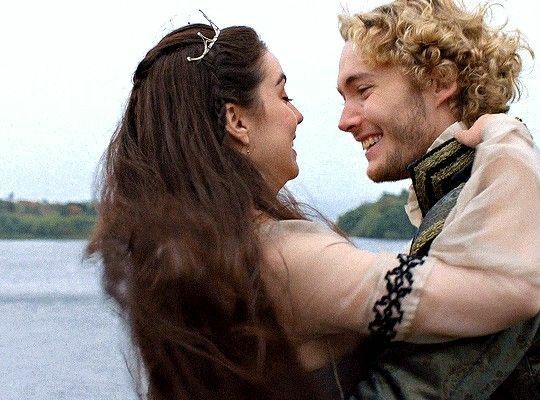

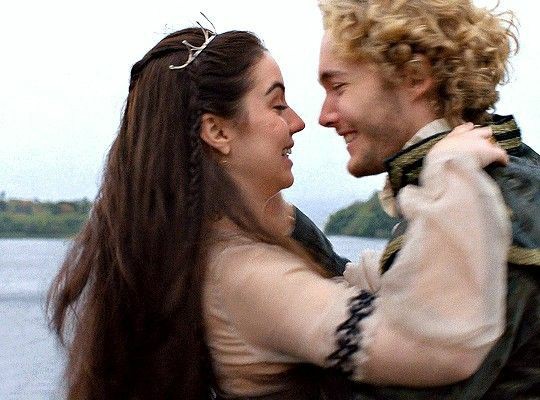

Reign 2013-2017/02-04
Mary and Francis
#mary stuart#francis de valois#adelaide kane#toby regbo#frary#mary×francis#season2#02×04#frary 's baby#face expression#happiness#love#mummy and daddy#francis and mary's theme#trevor morris#spotify#SoundCloud
5 notes
·
View notes
Text
furry au thomas thorne accidentally shoots a human out of the sky in his duel pass it on
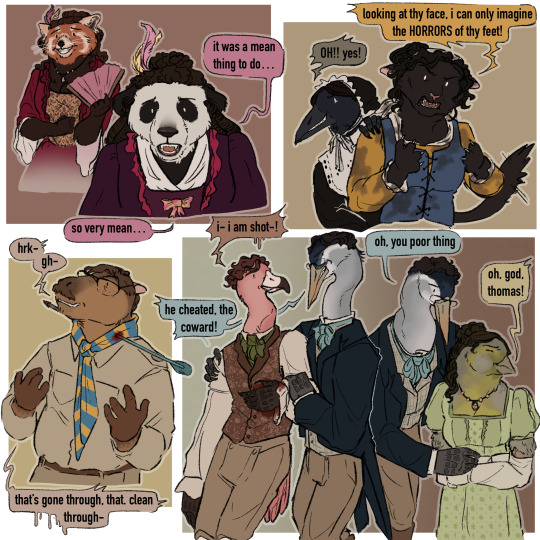
#fuck you (hits your angst with the furry beam)#new additions! eleanor: red panda. annie: crow. francis: heron. isabelle: green finch#i need to be autistic about heron!francis for a moment#so herons represent death that’s like an obvious connection#but also they’re surprisingly brutal !!#despite their gracefulness n shit#those fuckers Can and also Will eat rabbits whole#i just think that links nicely to francis outwardly being very charming but on the inside being horribly cunning and ruthless#if you’re wondering why isabelle is a green finch the short answer is listen to Green Finch and Linnet Bird#the long answer is in the tags of one of my thomas/isabelle drawings#annie is a crow bc they’re loud and mocking and also are found near witches <3#i go into more depth there#eleanor is a red panda to keep with the panda theme while still making her distinct#also. cute looks r deceiving#bbc ghosts#bbc ghosts eleanor#bbc ghosts kitty#bbc ghosts annie#bbc ghosts mary#pat butcher#thomas thorne#francis button#isabelle higham#sorry the tags r so long
179 notes
·
View notes
Note
"rn I feel like reading about someone's quiet daily life, maybe a diary or letters, set in a place or context I don't know much about, without turmoil or tragedy" oh! do you have any recommendations for books like this?
This is one of my favourite types of books! Here are 30(ish) recs...
May Sarton's The House by the Sea or Plant Dreaming Deep
Gyrðir Elíasson's Suðurglugginn / La fenêtre au sud (not translated into English unfortunately!), also Bergsveinn Birgisson's Landslag er aldrei asnalegt / Du temps qu'il fait (exists in German too)
Gretel Ehrlich's The Solace of Open Spaces, which iirc was originally written as journal entries and letters before being adapted into a book
Kenneth White's House of Tides: Letters from Brittany and Other Lands of the West
Sei Shonagon's Pillow Book
The Diary of a Provincial Lady, E. M. Delafield
Growing Up with the Impressionists: The Diary of Julie Manet
Elizabeth and Her German Garden by Elizabeth von Arnim (do not read if you don't like flowers)
The Road Through Miyama by Leila Philip (I've mentioned it before, it feels like this gif)
The Sound of a Wild Snail Eating, I keep recommending this one but it's so nice and I love snails
Epicurean Simplicity, Stephanie Mills
The Light in the Dark: A winter journal by Horatio Clare
The Letters of Rachel Henning
The letters of Tove Jansson, also The Summer Book and Fair Play
The diary of Sylvia Townsend Warner—here's an entry where she describes some big cats at the zoo. "Frank and forthcoming, flirtatious carnivores, [...] guttersnipishly loveable"
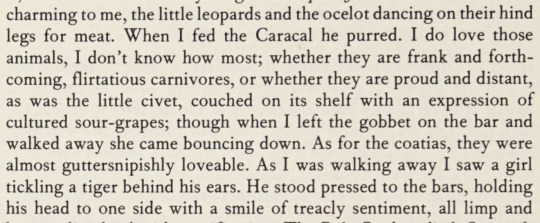
The Letters of Rachel Carson & Dorothy Freeman were very sweet and a little bit gay. I mostly remember from this long book I read years ago that Rachel Carson once described herself as "retiring into her shell like a periwinkle at low tide" and once apologised to Dorothy because she had run out of apple-themed stationery.
Jane Austen's letters (quoting the synopsis, "Wiser than her critics, who were disappointed that her correspondence dwelt on gossip and the minutiae of everyday living, Austen understood the importance of "Little Matters," of the emotional and material details of individual lives shared with friends and family")
Madame de Sévigné's letters because obviously, and from the same time period, the letters of the Princess Palatine, Louis XIV's sister-in-law. I read them a long time ago and mostly I remember that I enjoyed her priorities. There's a letter where she complains that she hasn't received the sausages she was promised, and then in the next paragraph, mentions the plot to assassinate the King of England and also, the Tartars are walking on Vienna currently.
Wait I found it:
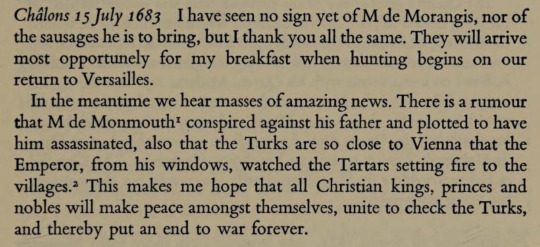
R.C. Sherriff's The Fortnight in September (quoting the author, "I wanted to write about simple, uncomplicated people doing normal things")
A Tree Grows in Brooklyn, Betty Smith
Pond, Claire-Louise Bennett
Rules for Visiting, Jessica Francis Kane
The following aren't or aren't yet available in English, though some have already been translated in 5-6 languages:
ツバキ文具店 / La papeterie Tsubaki by ito Ogawa
半島へ / La péninsule aux 24 saisons by Mayumi Inaba
Giù la piazza non c'è nessuno, Dolores Prato (for a slightly more conceptual take on the "someone's everyday life" theme—I remember it as quite Proustian in its meticulousness, a bit like Nous les filles by Marie Rouanet which is much shorter and more lighthearted but shows the same extreme attention to childhood details)
Journal d'un homme heureux, Philippe Delerm, my favourite thing about this book is that the goodreads commenter who gave it the lowest rating complained that Delerm misidentified a wine as a grenache when actually it's a cabernet sauvignon. Important review!
Un automne à Kyôto, Corinne Atlan (I find her writing style so lovely)
oh and 西の魔女が死んだ / L’été de la sorcière by Kaho Nashiki —such a little Ghibli film of a book. There's a goodreads review that points out that Japanese slice-of-life films and books have "a certain way of describing small, everyday actions in a soothing, flawless manner that can either wear you out, or make you look at the world with a temporary glaze of calm contentment and introspective understanding [...]"
I'd be happy to get recommendations in this 'genre' as well :)
#book recs#i should have posted this ages ago but i was waiting to finish the book i was reading to see if it#should be added to the list#but in the end it wasn't worthy#sorry for the delay!
2K notes
·
View notes
Text

pt: doll-themed names and pronouns. @/dwllie's 200 event. end pt.
♰ ⠀ — ⠀ DOLL-THEMED NAMES & PRONOUNS. @dwllie's 200 EVENT.

dolleine
antoinette
dolly
sweetheart
dollface
bennett
evette
luciana
blush
marie-grace
maryellen
corinne
lanie
francie

doll / dolls
do / doll
dolly / dolly
blush / blushes
dress / dresses
pretty / pretties
touch / up
display / displays
play / plays
show / case
showcase / showcases
showcase / showcased
dress / up
ball / joint
plastic / plastics
wooden / woodens
marionette / marionettes

#✚ the infant god 。#✚ names & prns 。#names#name list#name ideas#name suggestions#pronouns#pronoun list#pronoun ideas#pronoun suggestions#neopronouns#neopronoun list#neopronoun ideas#neopronoun suggestions#dwllie200
37 notes
·
View notes
Text
I’ve been thinking about Thomas and the theme of change that runs through the show.
Thomas establishes early on in series 1, "You stay how you die," implying that the ghosts are incapable of change. We know that’s not true, of course. Robin is the best example of that. Not only does he manage to grasp concepts that are foreign to him (playing chess, doing crossword puzzles etc.), he has also learned at least one new language since he died. Like him, all the other ghosts have grown over the course of the series in one way or another, be it Fanny who realises that love is love, Pat who recognises that he pushed Carol away, Julian who's beginning to understand how much time he's wasted away from his daughter or Kitty who is slowly coming to terms with how her sister treated her. Mary, in fact, has grown so much that she was able to find peace and move on.
Thomas is the only one who seemingly hasn’t grown. He’s standing still, very much set in his ways, and I think that's because his character arc is not about finding love or realising romantic love is not what he needs to be happy but rather about change.
As I mentioned before, Thomas is the one who insists, "You stay how you die." He’s also the one who tells Alison, "We can change!" making it sound like that’s something the ghosts have control over even though we know it’s actually more of a subconscious process. So why does Thomas phrase it like that, then?
Because for him, it actually is something he can control because the Thomas we know, the Thomas the ghosts and Alison know, is not real. He’s merely a role Thomas has perfected over the years to protect himself from getting hurt, and there are mainly two reasons why I think that:
The theme of abandonment: we saw both Isabelle and Francis abandon him when he was dying, and while I know a lot of people believe the story Thomas tells about his mother letting him cry when he was a baby was just him seeking attention, I do think there was some truth to it because it's been established that Thomas doesn’t lie. He’s able to bend the truth and make it less painful (the kiss with Isabelle that never happened, him talking about his grand tour etc.) but he does not flat out lie. So if we take that into account, all three people he mentions from his life have abandoned him in some way. He not only died alone and unloved, he probably lived that way too and I would argue he is still “living” it. He can often be seen sitting or standing at a distance from the group (the double denim scene, or when Alison thanks them for the review) as if he's not quite part of it or at least feels like he isn't.
The differences between alive and dead Thomas: I think it's worth noting that the Thomas we see in the flashbacks is quite different from the Thomas we know. His love for Isabelle is a gentle and respectful thing whereas his "love" for Alison is the complete opposite. He also seems to have been quieter in life – still confident in his abilities and with a penchant for drama but in a subdued, more serious way. It’s a side of him we sometimes get glimpses of in the show: when he watched the sunrise with Alison, when he told Kitty she didn't need to pretend to like his poetry or after he went through withdrawal. Thomas’s true character shines through in those moments and the fact that we actually get to see that shows that Thomas is changing - just very slowly. For him, change is not about becoming a new, better version of himself or having a profound realisation about someone or something. It’s about feeling safe enough to let the mask fall and be himself around others, and about trusting them not to turn their backs on him when he does.
The main problem with that is that the others have given him no reason to feel safe so far. They constantly roll their eyes when he so much as opens his mouth and rarely bother to hide the fact they consider him a nuisance. Part of that is obviously Thomas’s own fault since the act he puts on is meant to push others away. But the others aren't blameless either. We know they can all be incredibly respectful and considerate when it comes to each other's trauma. It's an unspoken rule not to bring it up unless the person themself does (Fanny's death and George's affair, Kitty's sister, the Captain's sexuality and so on). That rule, however, does not apply to Thomas. When he goes to Alison to talk about his death, she barely pays attention to him at first. It’s only when the others come in, take over his story and turn the most traumatic moment of his life into the evening's entertainment that she gets invested in it. Gone is the respect and consideration they’d all normally show in such a situation - because it’s Thomas, and no one ever takes his feelings seriously.
I think in order for Thomas to change, the others need to change first. They don’t have to pretend to like his poetry or find his outbursts charming or anything like that but they need to make him feel safe the same way they make each other feel safe when they're at their most vulnerable. We got a small glimpse of what that could look like in the Comic Relief special when Kylie asked Thomas to finish the song. Everyone was supportive of him in that moment and genuinely happy for him, and I think that's exactly what Thomas needs to let his guard down and stop pretending he's someone he's not: to feel accepted and part of the family.
#this is just my personal interpretation of course#but I needed to get it out my system because Thomas's relationship with the theme of change is really interesting#thomas thorne#bbc ghosts#bbc ghosts headcanon#mp bbc ghosts
146 notes
·
View notes
Text
I recently finished Mary & George, a limited series that portrays a fictionalized version of the story of Mary Villiers and her son George, aka The Duke of Buckingham, who rose to power in the early 17th century court of King James VI (Scotland) and I (England).
It's very good, probably one of the better historical pieces I've seen this year. Julianne Moore (Mary Villiers) and Nicholas Galitzine (George Villiers) are excellent in their roles, and it's full of a great supporting cast as well, with particular honorable mentions going to Tony Curran as King James, Laurie Davidson as Somerset, Niamh Algar as Sandie, Nicola Walker as Lady Hatton, and Mark O'Halloran as Francis Bacon.
The story basically goes like this. Mary Villiers, the widow of a minor member of the aristocracy, molded her handsome son George into becoming a lover of King James, who was well known to prefer the company of beautiful young men. (Or as the show puts it, in probably the funniest line I've ever heard, James was, "So cock-struck it's like a curse.")
The trailers for the show seemed to lean heavily on the raunch and comedy aspects, and there certainly are plenty of steamy sex scenes and irreverent laughs to be had, but there's a more serious story here as well, with themes of corrupting power taking precedence over the lighthearted.
Mary Villiers is obsessed with gaining power and favor, and more than willing to pimp out her gorgeous son to do it. And yet Julianne Moore adeptly shows Mary's side of the story, with the complicating factors of being a woman in the 17th century and therefore lacking in any traditional access to the avenues of power and wealth. "Women grow by men", as Shakespeare's Nurse famously puts it, in a play written around the time that Mary was giving birth to her son.
Moore and the script infuse the character with wit and sarcasm, even when she's being her most evil self. And yet Mary is an unreliable narrator at best. There's a scene in the final episode, where she questions George's by now outrageous behavior, and seems to sincerely claim, "You are not who I raised". But her every action thus far makes that an obvious and galling lie, and the fact that she believes this lie renders the character's level of self-awareness as practically non-existent. To the end, she seems to accept no guilt or responsibility at all for either the predictable corruption and downfall of her son or the brutal consequences suffered by her girlfriend and co-conspirator, Sandie (Niamh Algar). But Moore's performance of this unconscious amorality is both fascinating and liberating to watch.
Galitzine is also exceptional at presenting the journey of George Villiers from a vulnerable young man into quite a monstrous egomaniac. In the beginning, George seems to act mostly out of a desire to keep his mother satisfied and even, at times, a sincere affection for the King. But as time goes on, and he must scheme and plot to maintain his place as the King's favorite, he transforms into an arrogant, selfishly ambitious, and recklessly dangerous member of the royal court. It's a complicated portrayal of a character that's a little slutty, a lot scheming, but still occasionally sincere, and sometimes even struck by conscience. His best moments, such as his patience and care for his neurodivergent brother, make the audience mourn the loss of the uncorrupted young man he was, and not the petty tyrant he turns into. Galitzine also looks screen scorchingly beautiful in every scene, which doesn't at all detract from his more nuanced performances.
My one quibble with the piece is the script's characterization of King James. Actor Tony Curran is very charming as the romantic, mercurial, and "cock-struck" King, but that may be a fault rather than a feature of this depiction. James gets off rather easy, compared to everyone else. After all, he's the one who turned his personal relationships into a patronage system that basically boiled down to a sex-for-power scheme. People like Somerset, Mary Villiers and Buckingham may have exploited that system, but they didn't author it. And, although this is obviously imposing a wildly modern set of sensibilities on a historical show/events, one wonders if a man who made a habit of sleeping with much younger men who had far less power than he, should be made out to be quite so much the victim as he is in this series. Particularly the way they changed the historical circumstances of his death to fit the narrative of the pitiable gay king who just wanted to be loved but was continually let down or betrayed by his lovers.
Don't get me wrong, I did enjoy the performance overall. And his relationship with George also seemed touchingly sincere, but I also think they could have examined his role in corrupting those around him, both Somerset and Buckingham, more fully, rather than winking at it and mostly letting him off the hook.
Grade: A-
#mary & george#mary and george#nicholas galitzine#julianne moore#tony curran#review#spoilers#mary & george spoilers
38 notes
·
View notes
Text
120 SINF facts I collected while rereading the series
Behold, my magnum opus.
Josh likes Shrek
Dee has The X-Files theme song as his ringtone
Scatty doesn’t blink. Ever.
Dee gave Mary Shelley the idea for Frankenstein
Scatty can’t enter your room if you don’t invite her in
Scatty is a vegetarian
Perry needed to teach Nicholas English at some point because he forgot it
Ghosts love bathrooms
Josh is 5 cm taller than Sophie
Dee has always been fascinated by the idea of flying
Josh hates snakes, spiders, rats, and scorpions
Scatty hates rain, and it is one of the reasons she left Ireland
Scatty is allergic to feathers and fur
Scatty easily burns in the sun
According to the Codex, apples are poisonous and frogs can turn into princes, both of which Zephaniah confirms are incorrect claims
Zephaniah tried to marry off Scatty to king Nabukodonosor when she was 15
Dee prefers living in bigger cities
Scatty gets sick from using leygates
Josh is incredibly susceptible to seasickness
Nicholas helped create the French sign language
Machiavelli desecrated Nicholas’ and Perenelle’s graves more than three centuries ago and broke their gravestone. The Flamels saw everything
Zephaniah is an Elvis Presley fan
Sophie thinks European chocolate is too bitter
Scatty hates flying
Scatty speaks 6-7 HUNDRED languages
Machiavelli is the type of guy to punch a hole in the wall when he’s angry
Francis speaks ALL languages. ALL of them.
Scatty bites her nails when she’s nervous
Vampyres don’t sweat (this includes Scatty and Aoife)
Francis is terrible at tending to plants
Nicholas pulled off the first blood transfusion in history
Joan is also a vegetarian
Dee has a habit of cutting the phone call before the other person just so that his word can be last. Machiavelli is the most prominent victim of this
Dee doesn’t like flying
The Sphynx is afraid of dark
The pyramids in Egypt were built for the Danu Talis survivors
Josh collects fossilized feces
Joan loves cooking and grows spices on her rooftop
Machiavelli has manicured nails
Dagon often has nightmares about the fall of Danu Talis
Machiavelli knows how to program in five different programming languages
Machiavelli's one of the few world experts on quantum physics
Aerop-Enap tends to sleep off large chunks of human history
Sophie can run really fast
Machiavelli is a vegetarian
Machiavelli has stamina problems
Gilgamesh doesn't have an aura
Perry's aura doesn't have a smell
William cooks when he's nervous
Bastet can tolerate iron better than most Elders
Both Josh and Mars carry swords in their left hand
Machiavelli was the brain behind Napoleon
Francis is the only known person in the SINF universe that was born with the ability to see where leygates are
Scatty was told that she'd die in an exotic place
Billy speaks French
The Flamels worked on the first atomic bomb ever
Gilgamesh once requested to have the world’s first atomic bomb be detonated right above him. The Flamels placed him in a mental institution for 10 years because of it
Sophie doesn't like onions
Francis taught Aoife how to see leygates
Machiavelli thinks about his death unusually often
Niten is the only humani who defeated Scatty in a one-on-one fight
Virginia has a very expensive taste
Virginia lives in a tent
Canonically the reason Machiavelli and Dee keep underestimating Perenelle is that they're misogynists (at least according to Virginia Dare)
Niten collects classic cars
Dee is terrible at tending to plants
Aoife once crashed a vimana and blamed it on Scatty
Odin sacrificed his eye to an Archon in exchange for eldritch knowledge
Abraham has an extra finger on each hand
Krakens are actually only about an inch large. Apparently, sailors overestimated their size a little…
The Morrigan’s tears turn into small feathers
Dee is very susceptible to seasicknes
Nereus is responsible for the Bermuda Triangle dissappearances
Scatty and Aoife were the first of the Next Generation
The Codex has twenty-one pages
Hel imprisoned Joan in her shadowrealm once
Virginia and her flute are bonded
Billy has cold hands
Virginia doesn’t speak Latin, and neither does Billy
Mars has a coal black tongue
Sophie is afraid of spiders
Aten is a history nerd
Isis is older than Osiris
Virginia Dare is a Vegetarian
Virginia didn’t know how to speak until she was ten or eleven
Billy read Machiavelli’s The Prince
Josh looks up to Billy as a legend
Black Hawk dislikes spicy food
It’s possible to summon Elders by praying to them
Virginia was besties with Albert Einstein and her tales about shadowrealms inspired his theory of relativity
Prometheus is the self-proclaimed finest vimana flier in Danu Talis
Will abhors weapons and has never fired a gun in his life
The first humani created by Prometheus all had his facial features
Perenelle hates coffee
Tsagaglalal has no fingerprints
Josh suffers from claustrophobia
Perenelle once knocked out one of Quetzalcoatl’s back molars
Prometheus hates parrots
Prometheus read Niten’s book
Mars disagrees with just about everything in Niten’s book
There are rumors that Leonardo da Vinci was immortal
Hel loves raw pork
The only place in the world Dee hasn’t been to is Denmark
Aoife considers Khutulun, a prominent immortal warrior and niece of Kublai Khan as the “daughter she always wanted”. She is currently breeding horses in Kentucky
Isis and Osiris paint their nails black
Quetzalcoatl is a loner
Quetzalcoatl is responsible for The great Northeast blackout
Billy and Black Hawk are Star Trek fans
Machiavelli is a Star Wars fan
Machiavelli actually liked Napoleon
Tor Ri in which lives Abraham has exactly 248 steps
Marethyu doesn’t breathe or have a heartbeat
Isis and Osiris have dark purple tongues
One of the reasons Elders don’t like congregating in the same place is the risk that their auras could cause a natural disaster
Zephaniah is allergic to cats
Cookie-dough ice cream gives Virginia a rash
Dee’s favorite ice cream flavor is cookie-dough
Billy loves eating crab legs
Scathach and Aoife were trained by Tsagaglalal
Prometheus doesn’t have a pulse
#sinf#sotinf#not gonna lie i mostly made this list for myself#i think of it as a useful reference sheet
76 notes
·
View notes
Text
me running around in circles about the parallels that come together at the end of Checkmate:

(yeah)
what it says on the tin, below. Contains maximum spoilers.
(also contains references to themes of suicide, sexual violence, live chess, etc, because everything is connected.)
and because everything is connected, this is something like how it flows together in my brain. I’m not sure if it makes sense outside of it, and it’s certainly not exhaustive. I was mostly thinking about Marthe and Francis vs Kuzúm and Khaireddin. Bringing Sybilla, for example, more directly into it is a whole other spiral…
anyway:
As Francis decides whether Khaireddin or Kuzúm will die, Jerott asks, Which? The one who had experienced love and a modicum of happiness, or the one who had not.
Lymond said, “Marthe.” Marthe is the piece that takes Khaireddin. I think about Khaireddin as Marthe, sacrificed, while Francis and Kuzúm, loved by Philippa, are saved. Strangers switched as infants; siblings switched at death. In Amiens, Marthe convinces Sybilla to bully her son back to life. In Edinburgh, Philippa convinces Francis to spare Gabriel in order to save the son he has just learned exists. “I will not fail you, ever.”
Which child? The one whose life had been innocent, or the one who had been earliest corrupted and whose first uncertain steps had just been taken towards his birthright of friendship and joy?
Philippa rides to St. Mary’s with information that will destroy Joleta and Gabriel. Francis lets Gabriel kill Joleta when he could have died in her place, and I think about it as a sacrifice of his sixteen-year-old, vilified self. Like how Francis lets Khaireddin die to finally kill Gabriel. Khaireddin is Marthe, but he’s also another version of Francis, whether or not he’s his son. And the knight was the child who had not yet known happiness; the child Lymond had drawn to himself. Who is corrupted, and who is innocent? Who gets to know happiness?
“Then allow me to take the child’s place. I have no objections.” Roxelana and Güzel refuse, Khaireddin dies, and Philippa makes Francis promise to live. Marthe has told her he will not want to and told her brother that Philippa will not be thinking of herself. The marriage holds longer than the promise, but he still lives.
When Güzel is dead and Francis has made a new promise to his mother to live and return home, Marthe rides to Philippa’s home with news that would destroy Richard. Richard tries to save Marthe, but Austin destroys her, and they both do so thinking she is Francis. Depending how you count, there are four Crawford siblings and two of them are bastards. “Your father’s two sons will never meet again.”
“Like your son, I am a bastard.” “No, my dear. Forgive me, but I think you are a bastard like nobody else.” Marthe comes to England and dies before reaching Scotland. Francis tries to leave Scotland forever, to keep his brother safe. He fails. “Richard will be safe.” For the sake of someone he is just beginning to love, he does not let himself drown. The irony of “not yet.” He fails that Richard, too. It is an impossible task. The Crawford brothers take turns riding through the night to find each other alive and fracture again. Richard can never learn why Francis left, because that is the truth that would destroy him. And the sacrifice Francis made was unnecessary.
"Five years—even five such as these—can’t tear me drop by drop from your blood." Francis thinks of 1547-8 as the year he fought his brother. Richard’s sole, desperate purpose is to kill Francis, and he saves him instead. Francis’s purpose is to save Richard, and he tries, so hard, to kill himself. “I’m here to help you. You’re going to be free.” What can ten years tear apart?
Ten years later, Marthe says, “I am going to move the pieces. I am going to direct the end of the game.” Nostradamus tells her her part is still to come. In Constantinople, Francis is king and Marthe is queen. But Roxelana watches, and Güzel watches, making sacrifice necessary. In Dumbarton, the father of one pawn finds the mother of the second in his room. Adam watches, and then Richard finds them both. “So this is the outcome of it all. This is why Tom Erskine preserved you; why Christian Stewart died and Gabriel has worked to redeem you … for this. Francis, I would sooner have discovered you dead.” Richard doesn’t mention what he did that year, himself. The year he saved his brother. “Francis! I can’t let you take your own life.”
Lymond screamed once with agony, and then screamed and screamed again.
Joleta screamed three times, a thin, breathy kind of scream, with her hands spread rigid, like shining, flesh-eating plants before her.
In Volos, Francis will not let himself scream. He recites, and Marthe joins him. “I called you sister. Was I right?” “Yes. What made you sure?” “The luggage of poetry you carry.” In the sweet summer’s dell north of Hexham, Richard tells stories of everything but their father and does not want Francis to explain about Eloise. But, before that, it’s Richard who brings her up minutes before Francis stabs himself with his brother’s knife. God, Francis had screamed.
"My sister … Who will speak for her? ... Are you so short of rods that you must despoil young trees: so short of stones that you need to walk the very graveyards for them...?"
It’s a series bookended by dead sisters, dead by powder. Francis asks those questions when his own trial drags up rumors. If they were about Gabriel’s abuse of Joleta, they would be true. In Moscow, the night Francis comes to her room, Güzel says, “I too have had my Margaret Lennox and my Agha Morat and my child-whore Joleta Reid Malett.” But who is she? I think of Joleta, Míkál, and Philippa in his rooms in Dumbarton, Thessalonika, Constantinople, and Paris. Those are four very different nights. On one, he calls out to Eloise.
“I am going to call on Philippa, when we get to London. What will you do if I take her straight to my lodging and rape her?” Austin was very white. “Kill you,” he said. “If I can.”
Is Joleta innocent or corrupted when her brother kills her on the stairs? How much does it change the meaning of what Francis did to her at Dumbarton? That year, Philippa’s moves in the game are to tell Trotty Luckup’s version of Joleta’s story and to spare Gabriel to save Khaireddin. Which child?
Two great women who play with fate steer Philippa towards Kuzúm and towards Francis. In Algiers, a pawn’s mother dies and Oonagh turns to fire. Lymond was dedicated. And she…she was the sacrifice. He doesn’t know she is alive, and then he doesn’t know that he will find her dead. To Francis Crawford, this unknown son was a tragedy of which he must never learn. But he does learn. He sees her, but she will never see him again.
There were other children, and nothing to tell her whether the bubbling purr she heard at night, of a baby full and content, was his. … She did not know Khaireddin’s scream, or the sound Francis Crawford might have made when once he too was branded for the galleys.
This child; this unknown son of his blood, was worth one life: his own. … This, one felt of one’s son. Was it not also true of Gabriel’s?
In the chess game, who knows whose child is whose? Who makes sure they are there? Kiaya Khátún, with her whims, switches children and lovers. Marthe and Jerott marry each other as substitutes for Güzel and Francis. Philippa marries Francis because he promises to preserve his own one life. Francis believes that to live and return would be to kill his brother. Forced to go home, he believes he will return to Güzel.
Güzel, who was dead.
Francis reminds Archie that Philippa has released him from his promise. Archie has saved him so many times before. So has Jerott, who knocks the opium out of Francis’s hands and turns it to powder. So Francis decides to die joyfully, in fire and flood, ground by a burning mill on a river. Jerott pulls him from the river anyway, and holds him in his arms as he faces his mother and comes back to life, surrounded by love and tapers burning like Oonagh’s. "My life has a rudimentary value in that you were moved to preserve it." In Amboise and Blois, Oonagh leaves his survival to chance, but she also saves him.
“No. Oh Christ, no. It should have happened long ago.” Jerott knows that he has taken away a death Francis wanted. He stops Richard from intervening and lets Austin kill the rider none of them know is Marthe. “Don’t stop it. No one else could do it for him.” Jerott kills Austin without knowing whose death he’s avenging. It is the death of Marthe, who wanted her own life. The words from the garden in Djerba come to Jerott once he knows, as Francis and Philippa embrace. My beloved is dead.
As he aims, Austin is so sure he’s the only one who sees the real Francis Crawford, rotten and arrogant and undeserving of life. “Is it for this thou wast created?” thinks Philippa, who first saw Marthe as a shadow and a voice and mistook her for Francis. For Marthe, the answer to that question is yes. “Poor sister. A pawn more helpless even than…”
They had used a knife, so the child’s face was not distorted.
He aimed into the fair, weary, rancourless face, and then at the heart, and both balls found their mark and brought death in the end.
“Consider: who — stretching the imagination, of course, to its most grotesque outer limits — might be taken for my younger brother.”
Acting and not acting, Marthe speaks with the voice of the woman who created both of them, a dead chessmaster who won’t be silent. “You will harm her,” Francis warns Camille. Marthe tells Jerott, “I enjoy acting, as he does. The human scene is well rid of us both.” Many agree. Richard says to his brother, “My dear, you are only a boy. You have all your life still before you.”
“God damn you both. You summon and you throw away. You treat love like a bird for the table… Like a pawn, now in frankincense, now discarded and thrown in the dirt. You don’t know what love is, either of you. And God help us and you, if you ever find out.”
“Whatever made you think you were free? But because of you there will be something, I promise you, by which men will know Francis Crawford has been.”
“There’s an unnatural conspiracy to keep me alive, that’s all.”
“How do you take leave, for all time, of a brother?”
They set off that evening to take Marthe Crawford to the home of her fathers, which she had never known.
And they bury her in the dirt of Midculter, which her brother owns and will never own, where Kuzúm knows happiness.
#stringboard vortex of themes#I rest my case#it’s been fun to poke at over the last few weeks#quote fun unquote#lymond chronicles#checkmate#dorothy dunnett#francis crawford#and company#something i#lymond#lymond chronicles spoilers#marthe
41 notes
·
View notes
Text
Modern AU headcanons part whatever
•Robin is Welsh (he is also fluent in at least 5 other languages, including French)
•Kitty is a huge fan of Derry girls (she relates to Clare a lot). Thomas relates to James (can also be applied to canon universe)
•Kitty sees Isabelle as a big sister figure
•Cap and Pat are raising Kitty and Thomas in London ( they visit the North frequently)
• Thomas fought both Eleanor and Francis to protect Kitty and Isabelle
•Fanny is married to Pat’s sister (she is happy to finally be the butcher children’s aunt)
•Julian always has Twitter wars with anyone who has pissed him off.(he has frequently told Donald Trump to go fuck himself)
• Humphrey is an incredibly talented and famous comedian (Sophie always goes with him on his comedy tours)
• Humphrey is also an incredible artist (his daughter follows in his footsteps)
•Mary and Robin have 6 children all with space themed names (Mary successfully hid her sixth pregnancy from everyone)
16 notes
·
View notes
Text
THIS DAY IN GAY HISTORY
based on: The White Crane Institute's 'Gay Wisdom', Gay Birthdays, Gay For Today, Famous GLBT, glbt-Gay Encylopedia, Today in Gay History, Wikipedia, and more … January 7


Bayeux Tapestry - hawking
1130 – On this date the medieval poet Baldric Of Dol died (b.circa 1050). He was abbot of Bourgueil from 1079 to 1106, then bishop of Dol-en-Bretagne from 1107 until his death.
Balderic's poetic works were written almost entirely while abbot at Bourgueil. The 256 extant poems are found almost exclusively in a single contemporary manuscript which is most likely an authorized copy. They consist of a wide range of poetic forms ranging from epitaphs, riddles and epistolary poems to longer pieces such as an interpretative defense of Greek mythology. A praise poem for Adela of Normandy describes something very like the Bayeux Tapestry within its 1,368 lines. Two themes dominate his works: desire/friendship (amor)—including paedophiliac—and game/poetry (iocus).
In his collection My Dear Boy: Gay Love Letters through the Centuries, the scholar Rictor Norton publishes Baldric's many letters to male lovers.

1829 – William Maxwell is the last English sailor hanged for sodomy.

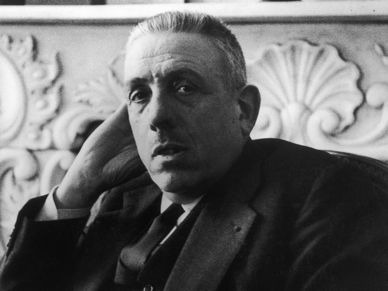
1899 – Francis Poulenc, French composer (d.1963); Poulenc was one of the first out Gay composers. His first serious relationship was with painter Richard Chanlaire to whom he dedicated his Concert champêtre: "You have changed my life, you are the sunshine of my thirty years, a reason for living and working." He also once said, "You know that I am as sincere in my faith, without any messianic screamings, as I am in my Parisian sexuality."
Poulenc also had a number of relationships with women. He fathered a daughter, Marie-Ange, although he never formally admitted that he was indeed her father. He was also a very close friend of the singer Pierre Bernac for whom he wrote many songs; some sources have hinted that this long friendship had sexual undertones; however, the now-published correspondence between the two men strongly suggests that this was not the case.
Poulenc's life was one of inner struggle. Having been born and raised a Roman Catholic, he struggled throughout his life between coming to terms with his "unorthodox" sexual "appetites" and maintaining his religious convictions.
Poulenc was profoundly affected by the death of friends. First came the death of the young woman he had hoped to marry, Raymonde Linossier. While Poulenc admitted to having no sexual interest in Linossier, they had been lifelong friends. Then, in 1923 he was "unable to do anything" for two days after the death from typhoid fever of his 20-year old friend, novelist Raymond Radiguet, Jean Cocteau's lover. However, two weeks later he had moved on, joking to Sergei Diaghilev at the rehearsals he was unable to leave, about helping a dancer "warm up."
In 1936, Poulenc was profoundly affected by the death of another composer, Pierre-Octave Ferroud, who was decapitated in an automobile accident in Hungary. This led him to his first visit to the shrine of the Black Virgin of Rocamadour. Here, before the statue of the Madonna with a young child on her lap, Poulenc experienced a life-changing transformation. Thereafter his work took on more religious themes, beginning with the Litanies à la vierge noire (1936). In 1949, Poulenc experienced the death of another friend, the artist Christian Bérard, for whom he composed his Stabat Mater (1950).
Poulenc died of heart failure in Paris on 30 January 1963 and is buried at the Père Lachaise Cemetery.

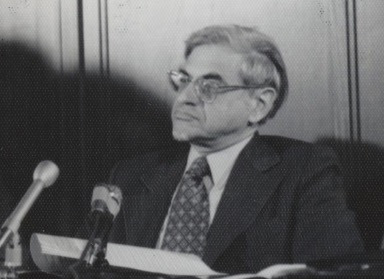
1917 – Alfred Freedman (d.2011), who was responsible for removing homosexuality from the list of mental illnesses, was born in Albany, New York. After earning his undergraduate degree at Cornell University in 1937, Freedman graduated from the University of Minnesota Medical School in 1941. He began an internship at Harlem Hospital but left before completion to enlist in the United States Army Air Corps. He left the service having attained the rank of Major.
After initially studying neuropsychology, Freedman trained in both general and child psychiatry, undertaking a residency at Bellevue Hospital. He became the chief of child psychiatry at the SUNY Downstate Medical Center, a post in which he served for five years, before becoming the first person to serve full-time as the department of psychiatry Chairman at New York Medical College, a post which he held for 30 years.
In 1972, Freedman was approached by the Committee of Concerned Psychiatrists, a group of young reform-minded doctors, who encouraged him to run for the presidency of the American Psychiatric Association. He won the election by 3 votes out of some 9,000 that were cast.
In his position as president, Freedman immediately supported a resolution offered by Robert L. Spitzer to delete homosexuality from the list of mental illness diagnoses. On December 15, 1973, the APA's board of trustees voted 13—0 in favor of the resolution, which stated that "by itself, homosexuality does not meet the criteria for being a psychiatric disorder" and that "We will no longer insist on a label of sickness for individuals who insist that they are well and demonstrate no generalized impairment in social effectiveness."
LGBT rights organizations have hailed this decision as one of the greatest advances for gay equality in the United States. Freedman himself believed that passing this resolution was the most important accomplishment of his one-year tenure as president. A second resolution called for an end to discrimination based on sexual orientation and the repeal of laws against consensual gay sex.
Alfred Freedman died in Manhattan on April 17, 2011, following complications after surgery to treat a hip fracture.


1946 – Jann Wenner is the co-founder and publisher of the music and politics biweekly Rolling Stone, as well as the current owner of Men's Journal and Us Weekly magazines.
In 1967, Wenner and Ralph J. Gleason founded Rolling Stone in San Francisco. To get the magazine off the ground, Wenner borrowed $7,500 from family members and from the family of his soon-to-be wife, Jane Schindelheim. In the summer following the start of the magazine, Wenner and Schindelheim were married in a small Jewish ceremony.
In 1995, Wenner found himself in the middle of a media storm when it was revealed that he was leaving his wife Jane after more than 25 years of marriage and had become involved in a relationship with Matt Nye, a former male model turned fashion designer. Wenner's outing, which may or may not have been at his own instigation, seems to have had little effect on his business empire, but it inspired a number of accusations regarding an alleged "Velvet Mafia" of powerful closeted gay men.
Although it had long been rumored that Wenner's marriage was an "open" one and gossip of his bisexuality was widespread and had been mentioned in gay magazines, in 1995 he was publicly outed—on the front page of the Wall Street Journal, no less—when the newspaper revealed that Wenner had left his wife of 28 years for Nye, a considerably younger man who was a former Calvin Klein underwear model.
Rumors of an alleged conspiracy to suppress the news began to circulate. Several journalists reported that the so-called "Velvet Mafia"—a coterie of powerful media, entertainment, and fashion executives who are reputedly gay—had threatened to pull advertising from any publication that wrote about the breakup.

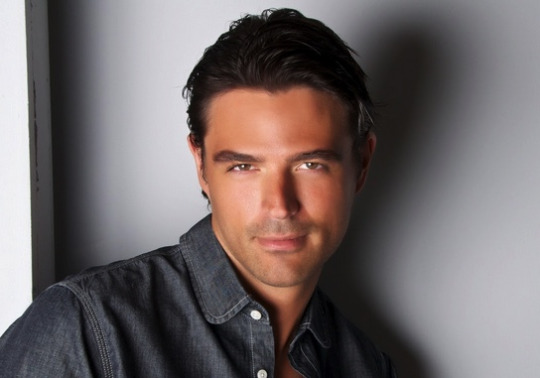
1977 – John Gidding is a Turkish-American architect, television personality, and former fashion model.
Gidding was born in Istanbul, Turkey to an American father and a Turkish mother. He lived in Turkey until moving to the United States for college after attending Leysin American School in Leysin, Switzerland. He graduated from Yale University in 1999 with a BA in architecture, then the Harvard Graduate School of Design with a Master's in architecture.
At Yale he sang a cappella with The Society of Orpheus and Bacchus, and choral music with the Yale Glee Club, and at Harvard he sang with the Harvard-Radcliffe Collegium Musicum. He was voted one of "Yale's 50 Most Beautiful People" in 1999 by Rumpus Magazine, one of "Boston's 50 Most Eligible Bachelors" by The Improper Bostonian in 2002, one of "Atlanta's 50 Most Beautiful People" by Jezebel Magazine and as one of Atlanta Homes and Lifestyles's "Emerging Talent: Twenty Under 40" in 2008.
He is openly gay and, as of August 2013, married to dancer Damian Smith.
Gidding started modeling in 2000 as a graduate student, performing runway shows for Armani, Gucci, and Hugo Boss before being represented by Wilhelmina Models in New York City. He's also been on the covers of numerous romance novels.
Gidding moved to New York City where he started John Gidding Design, Inc. after working for two years as a landscape architect for Michael Van Valkenburgh Associates.
Gidding's start in television was with the ABC Family TV show Knock First, where he and three other designers took turns making over teenagers' bedrooms. Designed to Sell (Giddings' previous show from 2006 to 2011) was canceled in early 2011 but still airs repeats on HGTV, and Knock First is still running in syndication internationally.
He is currently best known for being the architect-designer on Curb Appeal:The Block where his team spends $20,000 on improvements to the exterior landscaping of chosen homeowners. Less expensive touch-ups are done for 2 or 3 nearby neighbors' homes to improve overall neighborhood property values.


1990 – Michael Sam is an American football defensive end. He attended the University of Missouri, where he played college football for the Missouri Tigers football team for four years. Recruited by a number of colleges, he accepted a scholarship with Missouri. He was a consensus All-American and the Southeastern Conference Defensive Player of the Year as a senior.
Sam is the seventh of eight children born to JoAnn and Michael Sam, Sr. His parents separated when he was young. As a child, Sam watched one of his older brothers die from a gunshot wound. Another older brother has been missing since 1998, and his other two brothers are both imprisoned. A sister who was born before him died in infancy. At one point in his childhood, Sam lived in his mother's car. He was once accidentally maced by police who were arresting one of his brothers.
Sam argued with his mother over playing football, as she did not agree with those pursuits. Sam often stayed with friends while in high school; the parents of a classmate gave him a bedroom in their house and had him complete household chores. Sam is the first member of his family to attend college.
After completing his college football career, Sam publicly came out as gay. If he were to be signed by a National Football League (NFL) team, which analysts think is likely, he would become the first active NFL player to have declared his homosexuality publicly.
In August 2013, Sam took the opportunity of a team introduce-yourself session to inform his Missouri teammates that he was gay, and found them supportive. He avoided talking to the media to avoid addressing rumors of his sexuality. He came out to his father a week before coming out publicly. The New York Times wrote that his father, a self-described "old-school ... man-and-a-woman type of guy", said "I don’t want my grandkids raised in that kind of environment." His father told the Galveston Daily News that he was "terribly misquoted", though The Times maintained that he was quoted "accurately and fairly."
On February 9, 2014, he announced that he was gay in an interview with Chris Connelly on ESPN's Outside the Lines, becoming one of the first publicly out college football players. If he is drafted in the 2014 NFL Draft or signed by an NFL team as an undrafted free agent, he could become the first active player who was publicly out in NFL history. Though he was projected as a third- or fourth-round pick in the NFL Draft, anonymous NFL executives told Sports Illustrated that they expect Sam to fall in the draft as a result of his announcement. Those statements caused National Football League Players Association executive director DeMaurice Smith to respond that any team official who anonymously downgrades Sam is "gutless". From jail, his brother Josh said "I'm proud of him for not becoming like me. I still love him, whatever his lifestyle is. He's still my brother and I love him."
On February 15, Sam returned to Missouri with the Tigers football team to accept the 2014 Cotton Bowl championship trophy at a ceremony held at the halftime of a Missouri Tigers basketball game at Mizzou Arena. It was the first visit to his alma mater since he came out as gay. Anti-gay activist Shirley Phelps-Roper and about 15 other members of the Westboro Baptist Church, an organization widely considered a hate group, protested his appearance. Students organized a counter-protest numbering in the hundreds if not thousands, assembling a "human wall" in front of the protesters.
In May, 2014, Sam was drafted by St Louis Rams. He celebrated with a kiss for his boyfriend Vito Cammisano at an NFL draft party. The kiss went viral.



12 notes
·
View notes
Photo
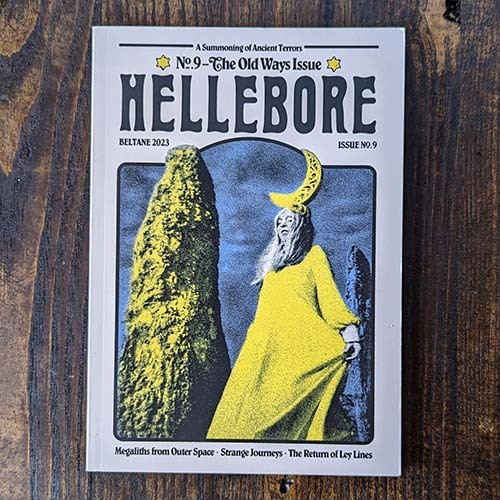
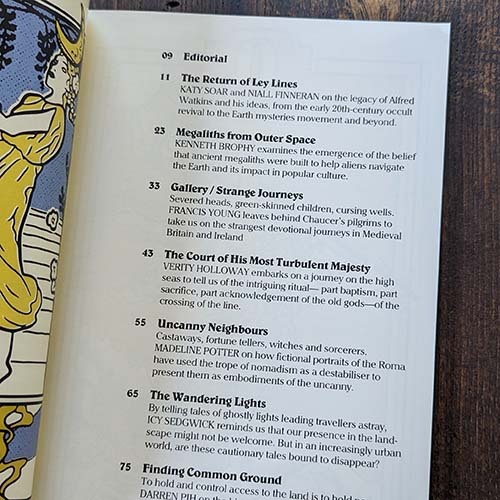



New at Portland Button Works and The Spiral House Shop!
Hellebore Issue 9: The Old Ways Issue
Step into the captivating world of HELLEBORE, a thought-provoking zine that delves into the realms of folk horror and the intriguing themes that fuel its inspiration. Delight in a curated collection of writings and essays that explore folklore, myth, history, archaeology, psychogeography, and the occult. Immerse yourself in the rich tapestry of words penned by esteemed contributors such as Katy Soar, Niall Finneran, Kenneth Brophy, Francis Young, Verity Holloway, Madeleine Potter, Icy Sedgwick, and Darren Pih. Accompanying these literary treasures are mesmerizing artworks by Clare Marie Bailey and Nathaniel Hébert.
In this issue, titled "The Old Ways," we embark on a profound journey celebrating landscapes and the unique ways in which we navigate them. Uncover tales of pilgrimages and rituals of crossings, be enthralled by stories of malevolent lights leading travelers astray, discover the intricate patterns woven into the fabric of the land, and ponder the enigmatic forces that shape megaliths. Delve into the secrets of the sea, the mysteries of marshlands, the serenity of rivers and fields, the allure of stone circles, the vastness of moors, and even the captivating enigma of outer space. Through these explorations, we unearth the stories that both captivate and shape us, as we honor the intricate link between landscapes, our imagination, and our inner lives.
The concept of the "country of the mind," as referenced by Kenneth Grahame in his timeless masterpiece The Wind in the Willows, comes to life within these pages. Just as Grahame sought solace and embarked on "high adventures" during his solitary walks in the countryside, we too invite you to embark on a journey of the mind—a journey that transcends the physical and connects us to something profound and ineffable.
Join us as we celebrate the allure of landscapes, the narratives that surround them, and the intricate interplay between our perceptions and the ethereal realm that lies beyond. HELLEBORE's The Old Ways Issue is a testament to the power of storytelling and the indelible impact landscapes have on our collective consciousness.
Find this and many more fine publications online here!
36 notes
·
View notes
Text
This is a selection of selfportraits from a series I made in 2011-2016. They're made with colour pencils on paper. In them I placed myself into various existing paintings and artworks. The series progresses from a fully finished drawing to the least finished drawing. The title of each work in the series is a female name (in lower case) and a body part. The body part in the title is always obscured in the image or not in the frame at all. Out of the fifteen portaits five are full body format, five are half figure and five are shoulders and up. Several of the works have very Mormon themes, and those are the ones I wanted to lift up here.
You can see the whole series on https://inariporkka.tumblr.com/portraits at the bottom of the page. That might not work on Tumblr app, might need to look at it on a browser.
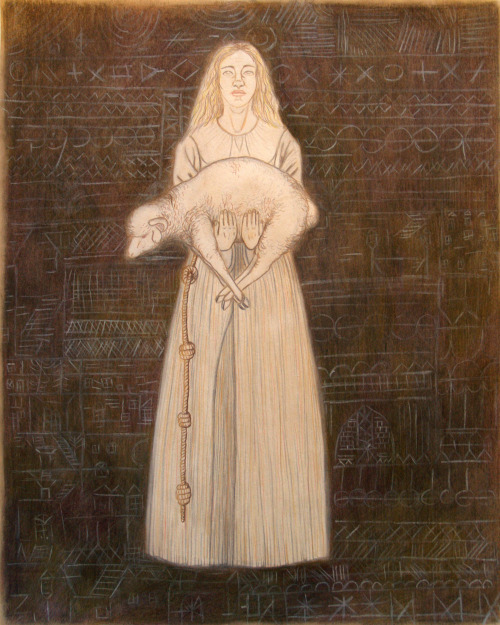
agnes (arms)
The name comes from the Latin term Agnus Dei, the Lamb of God. The painting inspiration is Zurbaran, specifically his Agnus Dei and his Saint Francis. The arms of the figure are obscured by the lamb she carries. It is ambiguous whether she is sacrificing the lamb or rescuing it. There is a possible indication of female priestesshood going on here. The background is a reference to an abstract artist whose name escapes me. I can't remember what I was going for there with the chalk on blackboard look - unfinished plans, maybe?

josephine (knees)
The name comes from Joseph Smith of course, and the main reference painting is of course that famous one of the First Vision. The other reference is this Renaissance trend of making religious paintings and inserting the donor of the painting into the scene. Like there are paintings of like Bible scenes like the crucifixion or Mary holding Baby Jesus and then some Renaissance guy in there too with them. So I put myself into the First Vision, like a donor. The figure is reading while kneeling behind a little... prayer box thingy that was in the original painting too, with the knees obscured. The idea there is that by reading other people's accounts of their experiences (such as Joseph Smith's First Vision) is like being there.

maria (shoulder)
The name is obviously a reference to Virgin Mary and the painting reference is to like early Renaissance/late Middle Ages iconography. Shoulders are hidden from view on one side by the veil and on the other by the baby leaning on the shoulder.

anna (loins)
I must admit I can't remember what the name is in reference to. But the painting is Whistler's Mother. I've drawn myself in place of the old lady in the original, my late dog is on the floor, and on the wall is my temple sealing diploma. On the left there is a white cloth - a curtain or the veil? The vibe is temple-y: either waiting to pass through the veil or having done it.

eva (nose)
The name refers to Eve. The nudity and the lush jungle all around (borrowed from Rousseau) suggest it's pre-Fall. Nose is hidden from view by the flower she sniffs. Since Mormons have a pretty different view of Eve compared to other Christians, it's kind of focused on just who she was, rather than eating of the fruit or any of those central story beats.

sara (neck)
The name refers to Sarah, the wife of Abraham. This is the most unfinished drawing in the series. To me it's about exaltation (hence the crown) and not being reasy for it yet. This one is also the first one in the entire series, so it follows the system the least - for example it's not as such a remix of a particular painting, just inspired by Botticelli in general, like the hair, really.
@personshapedsplder @lingering-sunrise
21 notes
·
View notes
Text
The Proud Family: Louder and Prouder Season 2 Review
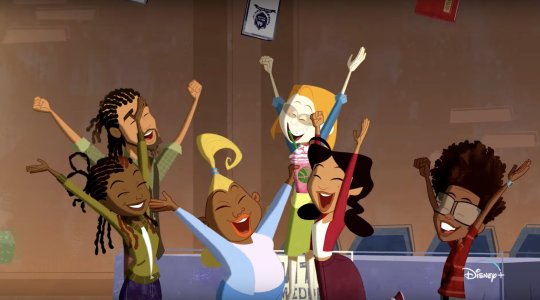
The Proud Family: Louder and Prouder is a coming-of-age animated sitcom and adventure by Bruce W. Smith and Ralph Farquhar, two well-known producers. It is a revival and soft reboot of The Proud Family, a classic Disney series by Smith which aired in the early 2000s. This review will have spoilers.
Reprinted from Pop Culture Maniacs and Wayback Machine. This was the twenty-third article I wrote for Pop Culture Maniacs. This post was originally published on February 13, 2023.
This animated series centers on Penny Proud (voiced by Kyla Pratt), a 16-year-old Black girl in the town of Smithville. She attempts to navigates her home life, filled the antics off her father, Oscar (voiced by Tommy Davidson), who owns a failing snack business, her mother, Trudy (voiced by Paula Jai Parker), a well-off veterinarian, her grandmother, Suga Mama (voiced by Jo Marie Payton), and her two siblings, Bebe and Cece. At high school, she has four friends-of-sorts: Michael Collins, Dijonay Jones, Zoey Howser, and LaCienega Boulevardez. They are voiced by EJ Johnson, Karen Malina White, Soleil Moon Frye, and Alisa Reyes respectfully. All the while, two new kids, Maya and KG, raised by two dads (Barry and Randall), try to adapt to their new life in Smithville.
The show's first season broke ground for featuring openly gay characters, unlike in the original series, such as Michael, who is also gender non-conforming. His voice actor even considered gender transition. This character is joined by an interracial couple: Barry and Randall Leibowitz-Jenkins, who voiced by two gay actors (Zachary Quinto and Billy Porter). They are the adopted fathers of Maya and Francis "KG", voiced by Keke Palmer and "A Boogie" Dubose. Palmer previously voiced Izzy Hawthorne in Lightyear, a lesbian character who has a wife named Alisha. She has also stated that she does not want her sexuality to be defined by labels and that people should be fluid when giving themselves labels.
The series has been swept in the culture wars, with claims it is promoting the "gay agenda" or is "anti-White". In reality, there are various White characters, including Zoey and Barry, and often promotes themes of racial togetherness, rather than division. Additionally, Michael is the only protagonist in the series who is part of the LGBTQ community. Barry, Randall, and Makeup Boy (voiced by Bretman Rock), with the latter beginning to date Michael later in the second season, are only recurring characters. In fact, Penny and Dijonay both have boyfriends, Darrius St. Vil (voiced by Chance the Rapper) and Kareem Abdul-Jabbar Brown (voiced by Asante Blackk), by the end of the season. Furthermore, Zoey is sweet on Myron (voiced by Marcus T. Paulk), and Maya romantically connects with one of the Chang Triplets, Billy.
Like the original The Proud Family, the series is not neutral when it comes to politics. It often focuses on racial injustice, whether noting past bans on interracial marriage, reparations, prejudice of Black people toward White people, anti-Black racism, sexism, or White skin privilege. This is interwoven with an emphasis on the importance of Black history, friendship, family, indigenous rights, harmonious neighbors, paying people fairly, respecting people for who they are, going beyond the color of their skin, and the folly of celebrity worship. Many books are name-dropped throughout the series, like Africans and Native Americans, as are the names of intellectuals such as Michelle Alexander, Robin DiAngelo, Elizabeth Acevedo, Leslie T. Chang, Saeed Jones, and Ta-Nehisi Coates. Many of these names are displayed during the English class taught by Kwame (voiced by Leslie Odom, Jr.).
Similar to season one, the second season of The Proud Family: Louder and Prouder provides more background about the characters, whether about Suga Mama's short-lived romance with an indigenous cowboy named Quanah (voiced by Wes Studi), and how Barry and Randall met, or the history of the Soul Vibrations band composed of Oscar and his brothers, and Giselle. As Penny says, in one episode, "you can't know yourself unless you know where you come from". This interconnected with the meaningful, and well-done, episode in which Bebe is diagnosed with autism, with the Proud family trying to figure out what to do with him, and coming to accept him, even if he requires more attention from them.
Other episodes focus on family conflict and fissures between friends, and neighbors, all of which are resolved before the end of each episode. This includes an episode when everyone is enamored with LaCienega's uncanny athletic ability (because of her big feet) and realize they have gone into a frenzy, another about Oscar, Felix, Puff, and Suga Mama fighting one another in an absurd parody of TV court shows, and one in which animals protest the awful Proud Snacks created by Oscar Proud. One of my favorite episodes in Season 2 featured a Princess Ball, with references to other Disney princesses: Penny dressed up as Princess Tiana, Dijonay as Cinderella, LaCienega as Princess Elena, Michael as Pocahontas, Maya as Beyonce, and Zoey as Princess Merida.
youtube
There are many notable characters in The Proud Family: Louder and Prouder like the Principal Hightower (voiced by Patricia Belcher), who insults and demans the students, reporter Vanessa Vue (voiced by Brenda Song) or incredibly wealthy Wizard Kelly (voiced by Aries Spears) who is shown as too tall to fit on the screen. However, in this season, Maya comes into her own, especially in the season two finale. In the episode, the ghost of Emily (voiced by Storm Reid), a Black girl enslaved by the town's founder, Christian A. Smith, guides her, revealing her diary which proves that Smith is a slaveowner, contradicting the common town myth.
In an interesting depiction of wealth-as-power, Wizard Kelly orders the police, clad in riot gear, to stop Maya, and her friends, who are protesting a ceremony dedicating Smith, with chants and placards. As a result, all of them, and their parents, are thrown in the city jail, despite the efforts of Barry to protect his children. His detective badge shown to mean nothing, as the police, who are serving as Kelly's goons, step over it with their boots.
Although Maya is just as determined as Wednesday Addams, in Wednesday, she does nothing equivalent to her. The latter, with the help of Thing, lights the statue of Joseph Crackstone, the Pilgrim founder of Jericho, on fire, causing it to melt. In fact, Kwame counsels his students to not pull down Smith's statue. This makes it ironic, then, that some reactionary media and personalities are all up-in-arms about the series, acting like it either "ruins" the original, or is "causing" division. Where were these people when Wednesday came out? They could have said some of the same things about that series, but they did not.
In many ways, the Season Two finale of The Proud Family: Louder and Prouder sets the series apart from methods of police control over the citizenry depicted in Velma or the incompetent police force shown in The Simpsons. That is because this series emphasizes how some can control and distort history to their benefit, covering up what they don't want others to see. There is no acceptance of the town myth which Lisa Simpson conceded to in The Simpsons. Instead, the town's name is changed to Emilyville and a new statue is erected. In a possible indication of the long-standing nature of the existing economic system, Kelly becomes the mayor of the town, and faces no consequences for cracking down on Maya, her friends, family, or other town residents.
This series features many guest stars like Jane Lynch, Gabrielle Union, Al Roker, Ceelo Green, and Andre Jamal Kinney, along with other lesser-known ones like Forrest Goodluck, and sports stars Laurie Hernandez, Gabby Douglas, and Dominque Dawes. Of the guest characters, I liked Dr. Lord (voiced by Holly Robinson Peete) best as she gives Penny a chance to talk about her experiences as the oldest child in the family, in which she is given additional responsibilities.
All of the episodes of the second season of The Proud Family: Louder and Prouder all aired on February 1st, unlike the previous season, which aired over a two month time period. There's strong animation and backgrounds which make the show stand out, as does the voice acting and music selection, which fit with stories and characters. It is unfortunate this 10-episode season isn't spread out across two months, because it would be easier to watch the series and take in all that happens. Even so, this season is much less glitzy than season 1 and that is to the show's benefit.
Furthermore, I appreciate that the series did an episode based on the little-remembered, or regarded, but wild, The Proud Family Movie, which seemed like an episode from Milo Murphy's Law, especially when they are fighting the Pistachions. In some ways, the episode reminded me of the annual Treehouse of Horror episodes of The Simpsons.
youtube
It is hard to know where The Proud Family: Louder and Prouder goes from here. If it follows the recent pattern of Disney series, such as Amphibia and The Owl House, it will have at least one more season. If that was the case, it would have one more season than the original series. However, it would need another 32 episodes to match the original, which aired from 2001 to 2005. This revival is different because the episodes range from 27 to 30 minutes, similar to the first season.
This series comes at the time that Disney is producing and airing series with diverse casts, like The Ghost and Molly McGee. In fact, this year, Iwájú, Kiff, Marvel’s Moon Girl and Devil Dinosaur, Primos, and Hailey's On It! are set to air. Disney has also contracted to produce series such as Cookies & Milk, Moana, and Tiana. On the other hand, Disney series with similar casts such as Mira, Royal Detective and Amphibia ended last year, while The Owl House is set to end this spring.
The Proud Family: Louder and Prouder is more unique, incorporating perspectives of Black creators, unlike Hamster & Gretel, Phineas and Ferb, Kim Possible, and Star Wars: The Bad Batch, which likely have mostly White writers rooms and have casts largely composed of White characters. As production coordinator, Breana Navickas, recently wrote, the show's writer's room is Black, and much of the staff is Black and "a mix of asian folks, latine folks, white folks". This shows in this season even more strongly than in the first season, with the series establishing itself more, and putting the original into the dustbin.
This series is not alone. Craig of the Creek, Victor and Valentino, Carmen Sandiego, Arcane, and Glitch Techs are all recent series with diverse stories and characters. As such, The Proud Family: Louder and Prouder, comes at an opportune time, when some executives are cutting back resources dedicated toward animated series, or squeezing workers in tough working conditions.
All in all, I thoroughly enjoyed the second season even more than the first, and hope that Disney orders another season sometime this year, considering the amount of people watching it. There are so many more stories to tell with these characters. This could include Penny getting new, and non-toxic friends. Even so, I doubt this will happen because the plot of the series depends too much on their existence to bring in new friends, just as Futurama would fall apart without the antics of the Planet Express crew keeping its current members. In addition, considering the issues with colorism in the original The Proud Family, and somewhat replicated in the first season, it was good to see that the Gross Sisters (Nubia, Olei, and Gina), all by Raquel Lee, only had a small part in this season. The fact that Maya had a bigger part in the season, instead of the Gross Sisters, is a welcome development.
One of the series' downfalls is repeating elements of narrative set-up in the original series. Although I still believe the series could be stronger if it focused on older versions of the cast, the second season made the characters, at their current age, workable. It didn't fall into simple tropes used in Kim Possible and Totally Spies!, both animated series centered in school environments.
Seasons 1 and 2 of The Proud Family: Louder and Prouder is currently airing on Disney+. While you are at it, you can watch The Proud Family and The Proud Family Movie on Disney+ too!

© 2023 Burkely Hermann. All rights reserved.
#the proud family#the proud family louder and prouder#anti white#princesses#disney princesses#culture war#the simpsons#milo murphy's law#kim possible#wednesday#velma#lgbtq#gay#phineas and ferb#hamster and gretel#the bad batch#colorism#futurama#amphibia#the owl house#totally spies#pop culture#reviews#Youtube
29 notes
·
View notes
Text
Book Rec
Devout: An Anthology of Angels
edited by Quinton Li
with creative contributions from:
Freydís Moon
Morgan Dante
Emily Hoffman
Dorian Yosef Weber
Daniel Marie James
Angela Sun
Cas Trudeau
Rae Novotny
Tyler Battaglia
rafael nicolás - @nicosraf here on tumblr
Ian Haramaki
Aurélio Loren
(I gathered as many social links and author websites as I could, but was sadly unable to find all of them! If you're the creator of one of the contribution to Devout, feel free to reach out so that I can update this rec to include your links; I'd love to promote your work).
The Storygraph link for this book includes information such as page count, publication date, and community-created content warnings.
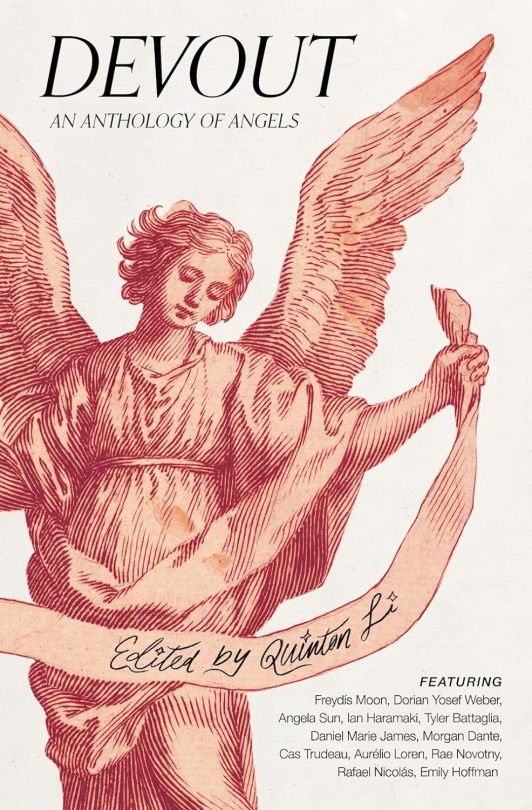
This anthology includes short stories, poetry, and a few pieces of artwork from a plethora of amazing creatives, all focused on themes of Christian and Jewish faith and the way angels intertwine with those belief systems—as well as how they interact with queerness, religious trauma, and much more. In the first story of the collection (written by Freydís Moon, who also wrote the superb Exodus 20:3 that I have reviewed here) the protagonist is a young trans man who has an erotic tryst with Satan in the back of a church after the fallen angel gives a sermon to the miracle-hungry congregation. And that’s just the tip of the iceberg.
This recommendation would be impossibly long if I were to describe every piece of creative work in this 200+ page anthology. I will try to be brief, then, and describe only my three favorite additions. However, one thing that stood out to me about all of the creative work in the anthology is that each written work is prefaced with content warnings created by the author. Since many of the stories and poems deal with content and themes that could be triggering, this was a really welcome addition.
The first story that grabbed me by the throat in Devout is “Seasons of God” by Angela Sun, which focuses on two French missionaries who come to a village in rural China to convert the locals to Catholicism. The story focuses on one of the missionaries, Francis, who attempts to save a local girl named Rui from being sold by her widower father due to her supposed uselessness. The story grapples with colonial attitudes and the possessive “love” of men who want to mold colonized people into perfect little Christians for further exploitation. Rui has a special power: she can see a strange, terrifyingly eldritch angel haunting the village. The story reaches an explosive conclusion when Rui’s father bursts into the church during Mass with an axe, seeking revenge for the financial loss of his daughter.
The second story I loved is “And the Mountains Melt like Wax” by Tyler Battaglia, which is set during the modern era and follows a firefighter named Abel who is on a hiking trip with his service dog, Cain. Abel has severe PTSD after a particularly bad fire, and is seeking clarity on his hiking trip into the mountains. He is alone except for the dog. Abel finds an impact crater where an angel (whose design is inspired by the Book of Ezekiel) has fallen to earth, and shares a granola bar with the creature. Abel asks for forgiveness for what happened when he entered that burning building, and I think the beauty in this story is that he receives neither absolution nor damnation for what he did—just like with real-world religious torment, there are no easy answers or simple solutions.
The final story I want to speak about is “Misery in Company” by Morgan Dante (whose other book, Providence Girls, I have recommended here). This story is an adaptation of Doctor Faustus, a play originally written in the Elizabethan era by Christopher Marlowe, where the protagonist is the demon Mephistopheles rather than the human magician (Dr. Faustus himself) who sold his soul to Hell in exchange for amazing powers and knowledge… and receives the services of a demonic manservant as well. In this story, Mephistopheles falls in love with the magician whose orders he is required to obey, and dreams of sharing a place in Hell with his beloved once his mortal lover dies of old age. Like other demons, Mephistopheles is a fallen angel who constantly reckons with his betrayal of God, and is always searching for a way to upstage his creator. Ultimately, however, he is thwarted in that attempt—just as the original play is a tragedy, so too is this short story. And like everything I have so far seen of Morgan Dante’s work, it is also masterfully written.
These three short stories are just my personal favorites from the collection. For those who favor more of a raunchy good time, I think they would enjoy “Paradises” by rafael nicolás, which features the angel Gabriel (a twink) becoming the lover of the Aztec rain deity Tlāloc behind God’s back, as well as Freydís Moon’s aforementioned contribution. There’s something in this anthology for everyone, I think.

You can find this book on Amazon Kindle or Smashwords
#book recommendation#bookblr#book recs#angel x human#queer fiction#lgbt fiction#trans romance#books and reading#spicy books#queer books#fantasy fiction
2 notes
·
View notes
Text
Reign like. Didn’t make sense, was completely historically inaccurate, and had some really weird themes but it was perfect for me senior year of high school because it was PEAK insane drama. Like yes of course literally every man is in love with Mary, have you seen her? The King literally thrusted so hard his lover fell out a window. Sebastian had to watch Mary have sex with Francis while their dad was right there. It had me CHEERING for these girls to get with Middle Aged men because it was so gripping.
I didn’t like S2 as much because literally every character cheated on their husbands and I didn’t think the sexual assault subplot was handled very well. But honestly it was all worth it for Mary to burst into Conde’s war camp to be like “I’m PREGNANT and you’re the FATHER and you have to protect me from my husband because I still LOVE you” and then turn around and stab him because it was all a trick.
#was obsessed with that evil middle aged man who was obsessed with Lola#first half of s1 Catherine who wanted Mary dead my beloved#how many kids did she even have there was Clarissa#unnamed older sister who disappeared after episode 1#Francis#bitch daughter#dead twins#and two younger boys I think#god that show#I honestly just wanted Mary to get with Sebastian#like I liked both boys but I’m also into the underdog loser in the love triangle
3 notes
·
View notes
Note
What are your favorite musicals and which musicals would you assign to your favorite countries based on personality? Yes, This is me asking what Music themes you'd assign them too I guess without looking at youtube and seeing videos 10 years old. I miss seeing Character Theme videos.
Oooh this is a good one! I'm also going to share musicals that make me think of some ships too because I want to ramble about the two musicals that make me think of a GerEng AU.
Okay but Characters.
Canada- Dear Evan Hansen
I know. Kind of basic. But I love DEH. "Waving Through a Window" is such a Mattie song. But what really sells the idea for me is that "So Big / So Small" is such a good song for Royal Red Bros. Francis is the dad that left, and Arthur tries to pick up the pieces, but also fails Matthew. Just the dynamic between Evan's Mom and Evan is just perfect for these two. Like Evan's mom does love Evan, but being a single mom isn't easy and to provide for him she has to work ridiculous hours so she's not there for him physically. Which is a similar postion Arthur finds himself in.
Also the lines
"That night I tucked you into bed
I will never forget how you sat up and said
'Is there another truck coming to our drive way?
A truck that will take mommy away.'"
Just hit me so hard with feels for Arthur and Matt. Just imagining a little Mattie asking Arthur one night if Arthur is going to leave him behind too. Because Francis left and Arthur seems so much more focused on Alfred. Matthew it terrified it will happen again. And it breaks Arthur's heart.
ALTERNATIVELY
Canada - Next to Normal (Specifically the song "Superboy and the Invisible Girl")
I don't know enough about what this musical is actually about other than we follow our main character Diana who is struggling with bipolar disorder and hallucinations of her dead son. And basically I think it shows how her condition affects her family?
But we did "Superboy and the Invisible Girl" for some concert once and I actually played Diana. And every time I rehearsed this song, all I could think of was ACE Family.
It is primarily Natalie, Diana's daughter, feeling neglected and ignored because of her Mother's grief over her son's death.
This line really makes me think of the two, especially after Alfred has become independent and Matthew attempts to pick up the pieces of a broken Arthur:
"Super boy and the invisible girl
He's the one you'd wish would appear
He's your hero, forever your son
He's not here, I am here"
---
America - Hamliltion
For obvious reasons. American history. Main character is smart, but also so impulsive. "I'm not Throwing Away my Shot" always make me think of Al.
---
England - Mary Poppins
Of course I choose something obvious. You know how much I love Arthur with kids. And Mary Poppins is that strict parental figure, but she does want what's best for the kids in her care, and I think that's perfect for Arthur.
Also I just love imagining Arthur singing "Feed the Birds."
Also also. get 2p England involved and make Oliver Bert. So double the Englands making it more fitting. Alternatively Gilbert could be Bert to make it Pruk instead.
---
GerEng - Chitty Chitty Bang Bang
I have this whole musical casted with Hetalia characters. But the summary first because its probably a musical not many know. I really don't know how to encompass everything so I'm just going to steal the summary from IMDb:
"A down-on-his-luck inventor turns a broken-down Grand Prix car into a fancy vehicle for his children, and then they go off on a magical fantasy adventure to save their grandfather in a far-off land."
God I had orginally had a long decription of a cast list for this but I'll ramble about that in another post. All you need to know though:
Arthur as Caratacus Potts - The down on his luck inventor and single father. Sometimes his work distracts him, but he really does love his kids
Ludwig as Truly Scrumptious - A candy heiress who meets the Potts family after almost running over the children when they run out into the road. She and Caratacus kind of get off on the wrong foot when she argues that the kids should be in school and not running around. But after he impresses her with his inventions and she joins them on their adventure in their magic car, the two fall in love.
Peter as Jeremy and Jemimah - Because I can't think of a second child to go with Peter I just have Peter right now. Because I love GerEng being dads to him.
Anyway. The songs.
First we have "You Two" which actually makes me imagine things separate from this au. Because this is also so good for ACE Family. I ramble about it more here.
"Doll On a Music Box" One of my favourite songs to listen too to daydream about GerEng. Just them pulling the same stunt Caratacus and Truly do to rescue the kids. Also Ludwig dressed up as a doll is a nice image.
"Lovely Lonely Man" Could work for either of them, but I always have loved the idea of Ludwig singing this about Arthur. Because Ludwig fell fast just like the song suggests while Arthur took a bit of time. It's just a perfect monologue of Ludwig admitting his feelings to himself.
God I could go on but I'll save the rest for a separate post
---
Okay one last one for GerEng! Music Man.
Summary from Stage Agent: "There’s trouble in River City! When smooth-talking con man Harold Hill arrives in a small, tight-knit town in Iowa, he expects to dupe its residents with his elaborate moneymaking scheme: Despite his complete lack of musical literacy, he will convince everyone that he is a brilliant bandleader and recruit all the boys in town to form a band, pocketing the cash for instruments and uniforms. The problem? Some of the town members, especially the stern librarian, Marian Paroo, don’t quite buy Harold’s story. As Harold struggles to keep his scheme afloat, he also finds himself increasingly attached to the townspeople, who have all experienced a positive change since Harold came to town. Complicating matters even more, Harold is also falling head-over-heels for the beautiful Marian."
God I could go on about this one too, but keeping it brief:
Arthur as the con man Harold Hill selfish and prideful only to have a change of heart by forming genuine connections within the town.
Ludwig as the stern yet also hopeless romantic Marian. That despite knowing Arthur is a con man sees him grow and falls for him
"Goodnight My Someone / Seventy-Six Trombones (Double Reprise)" The two leads main songs coming together with them singing each other's half way through. God I just love thinking of GerEng for this scene so much! I think its so romantic to sing each other's themes to each other.
Also "Goodnight My Someone" on its own is very fitting for Ludwig. As is Marian's chacter as whole. Both are stern indivduals, refusing to take nonsense from anyone. They seem like a stick in the mud, perhaps a little cold, but both have a sweetness deep down, longing for connection. And "Goodnight My Someone" is when we first see this side of Marian.
"Marian the Librarian" Just the back and forth and tension in this song. Hill/Arthur is kind of a dick. Flirting, but really he's just playing a game at this point and bugging Marian/Ludwig at work when they're clearly aren't having it. It's another fun scene I like imagining GerEng. Especially since Arthur is really pushing his luck angering someone who could snap him like a toothpick he'd be into that let's be honest but that's not a discussion for this blog
Thank you anon for letting me combine my love of musical theatre and my love for Hetalia together! I encourage more questions like this actually so don't be scared guys!
#hetalia#gereng#engger#geruk#royal red bros#hws canada#hws england#hws america#hws germany#musical theatre
8 notes
·
View notes